Faculty Research, Scholarship, and Creative Activity
Our award-winning faculty are nationally and internationally known for their scholarship and creative work in the fields of film, television, radio, theatre, and dance.
-
Sukanya Chakrabarti
-
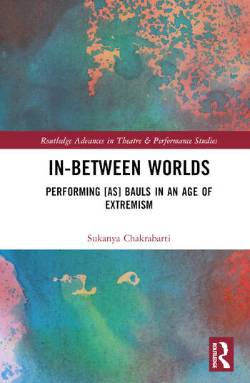 In-Between Worlds: Performing [as] Bauls in an Age of Extremism
In-Between Worlds: Performing [as] Bauls in an Age of ExtremismBy Sukanya Chakrabarti Copyright 2023
This book examines the performance of Bauls, ‘folk’ performers from Bengal, in the context of a rapidly globalizing Indian economy and against the backdrop of extreme nationalistic discourses.
Recognizing their scope beyond the musical and cultural realm, Sukanya Chakrabarti engages in discussing the subversive and transformational potency of Bauls and their performances. In-Between Worlds argues that the Bauls through their musical, spiritual, and cultural performances offer ‘joy’ and ‘spirituality,’ thus making space for what Dr. Ambedkar in his famous 1942 speech had identified as ‘reclamation of human personality’. Chakrabarti destabilizes the category of ‘folk’ as a fixed classification or an origin point, and fractures homogeneous historical representations of the Baul as a ‘folk’ performer and a wandering mendicant exposing the complex heterogeneity that characterizes this group. Establishing ‘folk-ness’ as a performance category, and ‘folk festivals’ as sites of performing ‘folk-ness,’ contributing to a heritage industry that thrives on imagined and recreated nostalgia, Chakrabarti examines different sites that produce varied performative identities of Bauls, probing the limits of such categories while simultaneously advocating for polyvocality and multifocality.
While this project has grounded itself firmly in performance studies, it has borrowed extensively from fields of postcolonial studies and subaltern histories, literature, ethnography and ethnomusicology, and cosmopolitan studies.
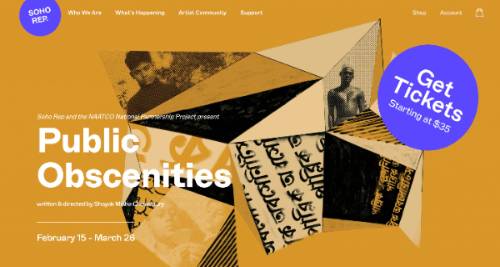
Cultural Dramaturg for Public Obscenities
Written and Directed by Shayok Misha Chowdhury
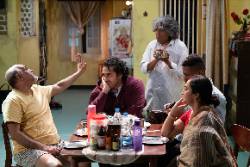 Public Obscenities is a semi-autobiographical, bilingual play by Shayok Misha Chowdhury about a young
man named Choton who returns to his grandfather's home in Kolkata, India with his
African American boyfriend, Raheem, to research the country's queer and trans culture.
The play explores themes of gender, sexuality, class, culture, family, and desire,
and is set against the backdrop of India's colonial-era "indecency" laws, which are
still in effect today.
Public Obscenities is a semi-autobiographical, bilingual play by Shayok Misha Chowdhury about a young
man named Choton who returns to his grandfather's home in Kolkata, India with his
African American boyfriend, Raheem, to research the country's queer and trans culture.
The play explores themes of gender, sexuality, class, culture, family, and desire,
and is set against the backdrop of India's colonial-era "indecency" laws, which are
still in effect today. Public Obscenities was a finalist for the 2024 Pulitzer Prize for Drama.
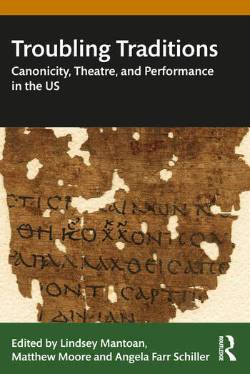 ‘"Go back to India if you hate my people so much": Consequences of Troubling the "Canon"
in American Academia’
‘"Go back to India if you hate my people so much": Consequences of Troubling the "Canon"
in American Academia’ By Sukanya Chakrabarti, in Troubling Traditions: Canonicity, Theatre, and Performance in the US (Edited By Lindsey Mantoan, Matthew Moore, Angela Schiller Copyright 2022)
Troubling Traditions takes up a 21st century, field-specific conversation between scholars, educators, and artists from varying generational, geographical, and identity positions that speak to the wide array of debates around dramatic canons.
Unlike Literature and other fields in the humanities, Theatre and Performance Studies has not yet fully grappled with the problems of its canon. Troubling Traditions stages that conversation in relation to the canon in the United States. It investigates the possibilities for multiplying canons, methodologies for challenging canon formation, and the role of adaptation and practice in rethinking the field’s relation to established texts. The conversations put forward by this book on the canon interrogate the field’s fundamental values, and ask how to expand the voices, forms, and bodies that constitute this discipline.
This is a vital text for anyone considering the role, construction, and impact of canons in the US and beyond.
This volume is the winner of the 2024 Edited Works Award at ATHE
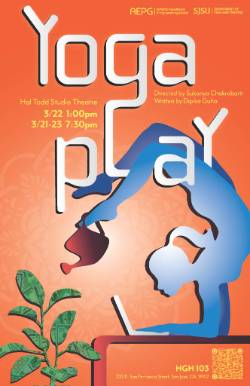 Director of Yoga Play
Director of Yoga Play by Dipika Guha, supported by the AEPG Grant, March 2024
Supported by the College of Humanities & the Arts’ Artistic Excellence Programming Grant, Yoga Play follows the character of Joan as she attempts to save an athleisure company on the brink of disaster. After doing damage control when the former CEO is accused of fat-shaming women, Joan discovers that there is more fire she has to fight to save the company and her career from collapse. Joan takes a risky path that results in more chaos and confusion. This sharp comedy compels us to rethink our relationship with truth, authenticity, and consumerism.
-
-
Jenni Hong
-
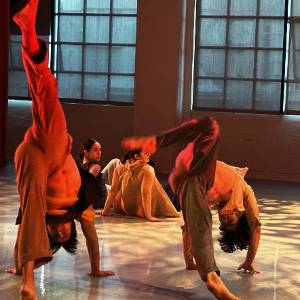 Jenni Hong premiered her new dance piece “beast” at ODC Theater in San Francisco in March 2024,
under a curated residency program that primarily serves BIPOC women choreographers
that are emerging or in their mid-careers. After 25 years of professional dance experience
in NYC, “beast” was also Jenni's first new dance work after moving to California.
It spotlighted intergenerational talent from the South Bay, including SJSU dance alums
and faculties.
Jenni Hong premiered her new dance piece “beast” at ODC Theater in San Francisco in March 2024,
under a curated residency program that primarily serves BIPOC women choreographers
that are emerging or in their mid-careers. After 25 years of professional dance experience
in NYC, “beast” was also Jenni's first new dance work after moving to California.
It spotlighted intergenerational talent from the South Bay, including SJSU dance alums
and faculties.
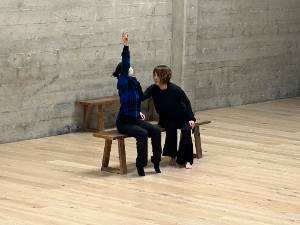 Jenni Hong was invited to be part of the “Encounters over 60” project with Sara Rudner via Margaret Jenkins Dance Company in 2023, and has since continued to engage in weekly movement research and explorations
in the “Meeting Room” Project with Sara Rudner, Risa Jaroslow, Wendy Rogers, Diane
Frank, among other seasoned dance artists in the Bay Area.
Jenni Hong was invited to be part of the “Encounters over 60” project with Sara Rudner via Margaret Jenkins Dance Company in 2023, and has since continued to engage in weekly movement research and explorations
in the “Meeting Room” Project with Sara Rudner, Risa Jaroslow, Wendy Rogers, Diane
Frank, among other seasoned dance artists in the Bay Area.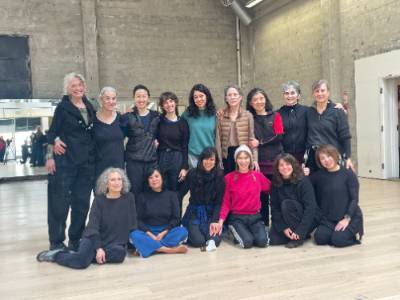
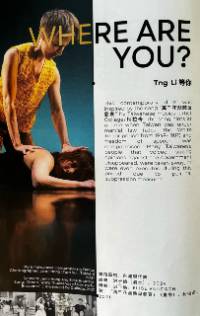 “I WAIT,” a dance duet choreographed by Jenni Hong, was presented by Bay Area Independent
Chinese Dancers at the Theater of Yugen in SF and again at the Taiwanese Cultural
Festival in SF in May of 2024 as part of Min Bridges: Stories from the Malay World,
Taiwan, and Mainland China. The duet hinted at a time when Taiwan was under Martial
Law (a.k.a. the White Terror period from 1949-1987) where freedom of speech was compromised.
Many Taiwanese people that voiced strong opinions against the government disappeared,
were taken away or executed during this period due to political suppressing measures.
This duet was performed by SJSU dance faculty Jenni Hong and Elise Knudson.
“I WAIT,” a dance duet choreographed by Jenni Hong, was presented by Bay Area Independent
Chinese Dancers at the Theater of Yugen in SF and again at the Taiwanese Cultural
Festival in SF in May of 2024 as part of Min Bridges: Stories from the Malay World,
Taiwan, and Mainland China. The duet hinted at a time when Taiwan was under Martial
Law (a.k.a. the White Terror period from 1949-1987) where freedom of speech was compromised.
Many Taiwanese people that voiced strong opinions against the government disappeared,
were taken away or executed during this period due to political suppressing measures.
This duet was performed by SJSU dance faculty Jenni Hong and Elise Knudson.
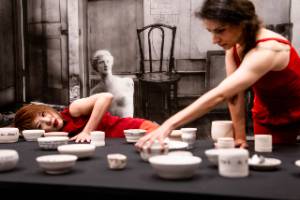 “Revolution is a Dinner Party” is an hour long improvisational, duration performance by dance artists Jenni Hong
and Katerina Bousleli at the Palo Alto Arts Center in June of 2024. This interdisciplinary
work was a collaboration between the performers (Hong and Bossola) and the PAAC 2024
resident, artist Martha Sakellariou. This was also the first time PAAC included dance
in their museum exhibits.
“Revolution is a Dinner Party” is an hour long improvisational, duration performance by dance artists Jenni Hong
and Katerina Bousleli at the Palo Alto Arts Center in June of 2024. This interdisciplinary
work was a collaboration between the performers (Hong and Bossola) and the PAAC 2024
resident, artist Martha Sakellariou. This was also the first time PAAC included dance
in their museum exhibits. 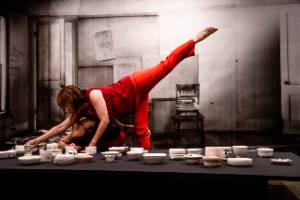
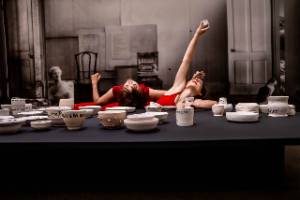
-
-
Elise Knudson
-
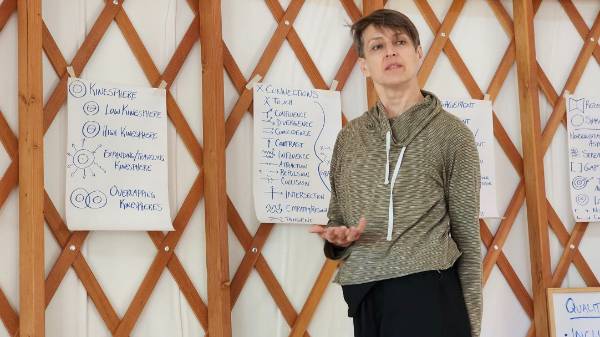
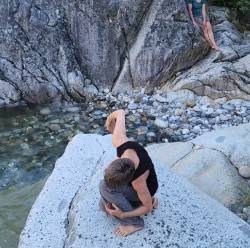 This summer began with five days of intensive research titled Happy Accidents with
experienced improvisation teachers/practitioners from around the country at a serene
retreat center near Nevada City facilitated by Rebecca Bone and Cullen Brown May 13-17th.
(photos by Angel Heyun)
This summer began with five days of intensive research titled Happy Accidents with
experienced improvisation teachers/practitioners from around the country at a serene
retreat center near Nevada City facilitated by Rebecca Bone and Cullen Brown May 13-17th.
(photos by Angel Heyun)
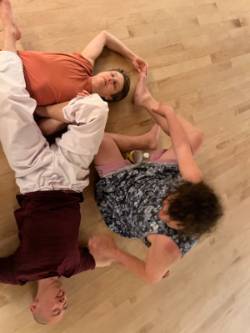 I participated in a ci and performance retreat with some inspired young people organized
by Lillyana Kane, Ana Vomacka, Chris Cahoon and Julianna Cariño in Gardiner, NY. (photographer
unknown, with Athena Anthea and Ming Tsai)
I participated in a ci and performance retreat with some inspired young people organized
by Lillyana Kane, Ana Vomacka, Chris Cahoon and Julianna Cariño in Gardiner, NY. (photographer
unknown, with Athena Anthea and Ming Tsai)
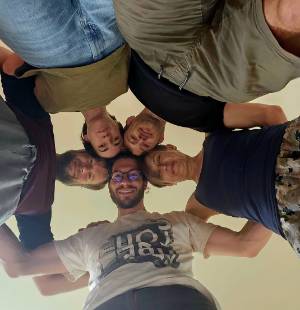 I participated in the earthdance Board of Directors bi-annual retreat June 21st-23.
(with Anna Maynard, Levi Gershkowitz, Dr. Daniel J. Hayes and John Adams)
I participated in the earthdance Board of Directors bi-annual retreat June 21st-23.
(with Anna Maynard, Levi Gershkowitz, Dr. Daniel J. Hayes and John Adams)
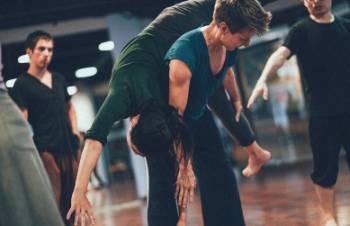 I then had the pleasure of returning to teach a section of a one week intensive at
Bainbridge Dance Center directed by Christiana Axelson on this beautiful island near
Seattle, WA July 8th - 12th.
I then had the pleasure of returning to teach a section of a one week intensive at
Bainbridge Dance Center directed by Christiana Axelson on this beautiful island near
Seattle, WA July 8th - 12th.
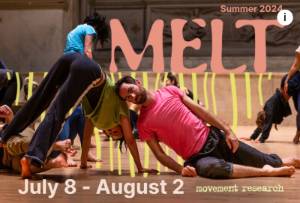 I participated in two amazing workshops at Movement Research’s summer Melt in New
York City July 29th - August 2nd with Jen Nugent and mayfield brooks.
I participated in two amazing workshops at Movement Research’s summer Melt in New
York City July 29th - August 2nd with Jen Nugent and mayfield brooks.
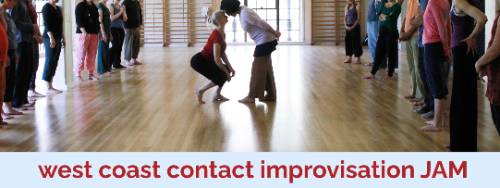
Then it was back to San Francisco for the West Coast Contact Improvisation mini Jam where I helped to facilitate score practice and support classes.
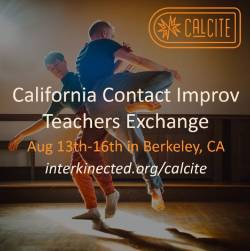 On the heels of WCCIminijam I participated in CalCITE: California Contact Improvisation
Teachers Exchange, where teachers from as far as Japan exchanged teaching practices
and delved into researching issues around teaching CI. I helped to facilitate conversations
and labbing on consent and scores.
On the heels of WCCIminijam I participated in CalCITE: California Contact Improvisation
Teachers Exchange, where teachers from as far as Japan exchanged teaching practices
and delved into researching issues around teaching CI. I helped to facilitate conversations
and labbing on consent and scores.
-
-
Shannon Rose Riley
-
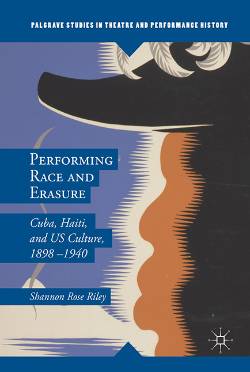 Performing Race and Erasure: Cuba, Haiti, and US Culture, 1898-1940 (Palgrave, 2016)
Performing Race and Erasure: Cuba, Haiti, and US Culture, 1898-1940 (Palgrave, 2016)In Performing Race and Erasure: Cuba, Haiti, and US Culture, 1898-1940 (Palgrave, 2016), Shannon Rose Riley provides a critically rich investigation of representations of Cuba and Haiti in US culture in order to analyze their significance not only to the emergence of empire but especially to the reconfiguration of US racial structures along increasingly biracial lines. Based on impressive research and with extensive analysis of various textual and performance forms including a largely unique set of skits, plays, songs, cultural performances and other popular amusements, Riley shows that Cuba and Haiti were particularly meaningful to the ways that people in the US re-imagined themselves as black or white and that racial positions were renegotiated through what she calls acts of palimpsest: marking and unmarking, racing and erasing difference. Riley’s book demands a reassessment of the importance of the occupations of Cuba and Haiti to US culture, challenging conventional understandings of performance, empire, and race at the turn of the twentieth century.
REVIEWS
Riley’s sophisticated study expands and challenges our knowledge of race, empire, and nation. She shows that the U.S. did not just export racial ideas and practices to the Caribbean islands it occupied and attempted to control. Race at home was also remade in ruling, fearing, and imagining Cuba and Haiti. Seeing music and performance more generally as sites of empire’s memory and forgetting Performing Race and Erasure brilliantly shows that a hardening sense that race could be reduced to black and white took shape outside the U.S. as well as inside."
David Roediger, Foundation Distinguished Professor of International & Interdisciplinary Studies, University of Kansas, USA
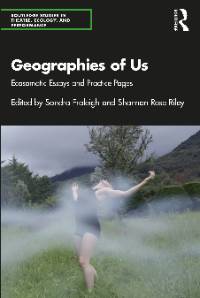 Geographies of Us: Ecosomatic Essays and Practice Pages (Routledge, 2024)
Geographies of Us: Ecosomatic Essays and Practice Pages (Routledge, 2024)Geographies of Us: Ecosomatic Essays and Practice Pages (Routledge, 2024) is the first edited collection in the field of ecosomatics. With a combination of essays and practice pages that provide a variety of scholarly, creative, and experience-based approaches for readers, the book brings together both established and emergent scholars and artists from many diverse backgrounds and covers work rooted in a dozen countries. The essays engage an array of crucial methodologies and critical/theoretical perspectives, including practice-based research in the arts, especially in performance and dance studies, critical theory, ecocriticism, Indigenous knowledges, material feminist critique, quantum field theory, and new phenomenologies. Practice pages are shorter chapters that provide readers a chance to engage creatively with the ideas presented across the collection. This book offers a multidisciplinary perspective that brings together work in performance as research, phenomenology, and dance/movement; this is one of its significant contributions to the area of ecosomatics.
The book will be of interest to anyone curious about matters of embodiment, ecology, and the environment, especially artists and students of dance, performance, and somatic movement education who want to learn about ecosomatics and environmental activists who want to learn more about integrating creativity, the arts, and movement into their work.
REVIEWS
This collection of essays gathers together important strands in the current studies of ecosomatics. It includes many ‘practice pages’ that open doors to the feelings that have generated the commitment of the writers to creating common grounds for deep conversation about the way people live in the ecologies of the world. The combination of affective strength, so difficult to articulate, with practical exercises—such as the many approaches to breathing as a form of ecoproprioception—will draw readers into places/ geographies where artmaking and philosophy join together and suggest new languages for thinking and talking about engaging with this Earth."
Lynette Hunter, Professor of Theatre and Dance, University of California, Davis
This seminal collection of essays maps the contours of an emerging field: ecosomatics. At the intersection of dance studies, movement studies, philosophy, and ecology, ecosomatics encourages ways of thinking and doing that cultivate a human’s sensory awareness of their bodily enmeshment in enabling places and worlds—nexuses of material relationships which call for respect, reciprocity, and responsibility. In essays written by an international cast of contributors, ecosomatics demonstrates its fierce commitment to social and environmental justice; a ready embrace of Indigenous knowledges, histories, and rights; thoughtful engagement with established fields of phenomenology, eco-philosophy, and dance studies; a lived, dialectical production of theory and practice, and an overriding mission to participate as consciously as possible in generating worldviews and bodily practices that sensitize humans to the ongoing health and wellbeing of the Earth in us and around us."
Kimerer L. LaMothe, PhD, author of Why We Dance: A Philosophy of Bodily Becoming
Geographies of Us provides an exciting snapshot of a diversifying field: of the different methods, playful encounters, bodymind approaches, and land politics that make up the contemporary ecosomatic inquiry, with plenty of invitations to join in the dance. At its heart, this collection is about local and grounded connection, about reaching out—in intergenerational liveliness and critterly entanglement, in touch and in movement, in human and more-than-human worlds."
Petra Kuppers, author of Eco Soma: Pain and Joy in Speculative Performance Encounters; Anita Gonzalez Collegiate Professor of Performance Studies and Disability Culture, University of Michigan
I consider this the most important work to emerge in interdisciplinary dance/performance studies this century. The depth and quality of engagement available to the reader in these pages has the potential to widely transform thought, practice, institutions, environments, and the lived relations between."
Karen Bond, Chair of Dance, Temple University
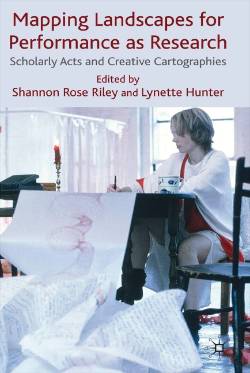 Mapping Landscapes for Performance as Research (Palgrave, 2009)
Mapping Landscapes for Performance as Research (Palgrave, 2009)Although the sciences have long understood the value of practice-based research, the arts and humanities have tended to structure a gap between practice and analysis. Mapping Landscapes for Performance as Research (Palgrave, 2009) examines differences and similarities between Performance as Research practices in various community and national contexts, mapping out the landscape of this new field.
-
-
Ashley Seering
-
Pride of Texas
A Short Documentary Film Completed in 2023 & Premiered 2024
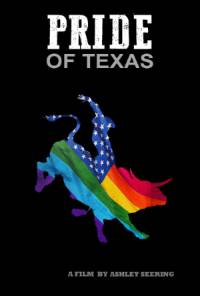 Pride of Texas tells the story of the Texas Gay Rodeo Association and sets out to
prove that rodeo, and Texas, is a place for everyone. The film is currently being
developed into a docu-series. It is currently in its festival run and has screened
at San Francisco DocFest, QFest St Louis, Sidewalk Film Festival, and others. It is
nominated for a Lone Star Sports EMMY Award and is the winner of a Broadcast Education
Association Festival of Media Arts Best of Competition Award in the Micro Documentary
category.
Pride of Texas tells the story of the Texas Gay Rodeo Association and sets out to
prove that rodeo, and Texas, is a place for everyone. The film is currently being
developed into a docu-series. It is currently in its festival run and has screened
at San Francisco DocFest, QFest St Louis, Sidewalk Film Festival, and others. It is
nominated for a Lone Star Sports EMMY Award and is the winner of a Broadcast Education
Association Festival of Media Arts Best of Competition Award in the Micro Documentary
category.
-
-
Raha Shojaei
-
Research and Scholarship:
“Her Veiled Voice: An Examination of Women’s Vocal Presence in Postrevolutionary Iranian Cinema”
This forthcoming book examines the vocal presence of women in postrevolutionary Iranian cinema. It investigates the veiling of women’s voices in New Iranian Cinema, their relationship to authoritative voices, and the constraints placed on them within cinematic spaces.
Creative Projects:
“Unveiling Echoes”
A multimedia performance installation exploring Iranian women’s narratives, funded by the 2024 MAP Fund.
“Beyond the Veil: Untold Narratives of Womanhood”
A documentary film that explores the voices of Iranian women through their own lives and stories.
 “Hills Like White Elephants”
“Hills Like White Elephants”A short film adapted from Hemingway’s story, currently in postproduction.
-
-
Matthew Spangler
-
Matthew Spangler’s adaptation of Khaled Hosseini’s The Kite Runner recently finished runs on Broadway, in London’s West End, and national tours in the U.K. and U.S., which included the Kennedy Center in Washington D.C.
Check out the Broadway US tour of The Kite Runner here and The West End UK tour of the Kite Runner here.
Matthew’s most recent book The Playboy of the Western World-A New Version by Bisi Adigun and Roddy Doyle, and co-edited with Jason King, was published by Syracuse University Press in 2024. It explores literary adaptation for the stage, as well as race and immigration to Ireland.
Matthew received a $174,000 grant from the National Endowment for the Humanities to lead a Summer Institute on the topic of immigration to California. The Institute funds 25 K-12 teachers from around the country to come to San Jose for two weeks where, everyday, they meet with a different artist or scholar whose work focuses on immigration. Presenters include Maxine Hong Kingston, Khaled Hosseini, Luis Valdez, Andrew Lam (writer and PEN Open Award recipient), and Ping Chong (performance artist and Presidential Medal of the Arts recipient), among others. Institute dates are July 13-27, 2025. For more information and how to apply, visit The Immigration Theatre Institute's homepage.
-